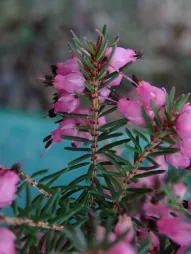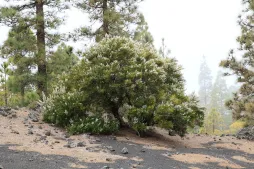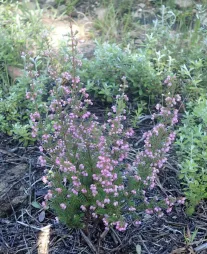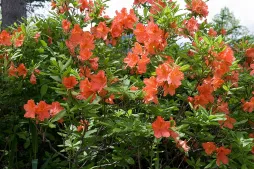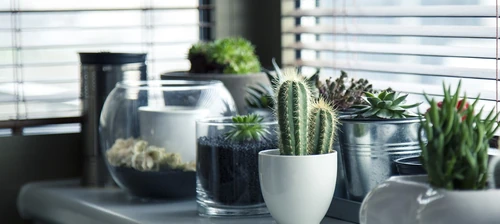Erica carnea, Alpine heather
Erica carnea grows in the mountains of Europe, from Germany to Greece and from France to Slovakia. This member of the Ericaceae family also occupies a special place in our gardens, where it blooms in the depths of winter.
How to recognize Erica carnea, the Alpine heather?
Erica carnea is a perennial subshrub with a creeping, spreading habit. It grows up to 60 centimetres high and is equally spreading.
The semi-woody stems bear low, slender, arching branches. They are almost entirely covered by green leaves, similar to fir needles. The leaf blades are tapered at the tip, less than a centimetre long and interlocked four by four, as in common Heather (Calluna vulgaris).
Alpine heather blooms in winter through to mid-spring. The bell-shaped flowers have protruding stamens. The botanical variety is white, but certain hybrids and cultivars can also be pink, red or mauve.
Erica carnea is non-toxic. You can grow it without risk, even if you share your garden with dogs, cats, rabbits or goats.
Our maintenance tips
Alpine heather are easy-care plants. Once well established, they require almost no care.
Watering
Your Alpine heather likes humidity. The plant appreciates frequent and generous watering. But its roots may rot if you overwater. To get the dosage right, leave the soil to dry out partially between two waterings (by about a centimetre). The substrate should always remain slightly moist.
After each watering, remove any stagnant water from the saucer or planter to avoid drowning the roots.
Repotting
Soak the root ball of your Alpine heather to rehydrate it. Shake the plant to remove excess water.
Get a pierced terracotta pot. You can make a bed of clay balls at the bottom to improve drainage. Mix at least 25% heather soil with ordinary potting compost. Pour on a layer of substrate and plant your Alpine heather.
Water generously to remove air bubbles and encourage rooting.
Fertilization
You can stimulate the growth of your plant during its growth phase, in spring and summer, with fertilizer.
Apply a fertilizer for heathland plants every two weeks. Follow the manufacturer's instructions to avoid damaging the foliage.
Prune
You are not obliged to prune your Erica carnea. You can, however, shorten branches with a clean, sharp tool to maintain a compact, rounded habit. Don't cut into old wood: the plant won't recover.
Also remove any spent flowers.
Plantation
Once the last spring frosts have passed, you can plant.
Soak the root ball of your Erica carnea plant. This will help the plant adapt better to its new environment.
Dig a planting hole twice as deep and wider than the root ball to prepare the soil. Alpine heather likes acidic, well-draining soil. If this is not the case in your garden, mix 2/3 heather soil with 1/3 ordinary potting soil. You can add sand to improve drainage.
Lay down a layer of substrate and plant your Erica carnea. The root ball should be level with the soil. Fill in the planting hole and water generously.
You can also mulch the base with organic matter to keep the soil fresh.
Cutting
Cutting is carried out during the strong growth phase, generally in spring and early summer.
Locate a healthy, flowerless stem. It should be semi-woody, but still flexible.
Cut a ten- to fifteen-centimetre section just below a node. Use clean, sharp secateurs to facilitate healing.
Remove the lower leaves and keep only the upper pair.
Pour a mixture of potting soil and sand into a pot whose hole has been plugged with a pebble. Push half the stem of your cutting into the center without watering.
Place the pot in a mini greenhouse; if you don't have one, you can cover the plant with a translucent bag or a cut bottle. Place your graft in a bright spot, without direct sunlight.
Every day, aerate for a few minutes to drain off condensation and mist.
Every day, aerate for a few minutes to drain off condensation and mist.
Disease / Threat
Phytophtora
Information
| Family | Ericaceae - Ericaceae |
| Type | Erica - Erica |
| Species | Alpine Heather - Erica carnea |
| Lifecycle | Perennial |
| Foliage | Evergreen |
| Exposure | |
| Substrat | |
| Planting methods |
Open ground In pots In tubs Planter |
| Category | |
| Tags |
Beginner Flowery Rustic |
| Origins |
Southern Europe Western Europe |
| Hardiness (USDA) | 7b |
| Leaf color |
|
| Flower colors |
|
Discover plants from the same family













